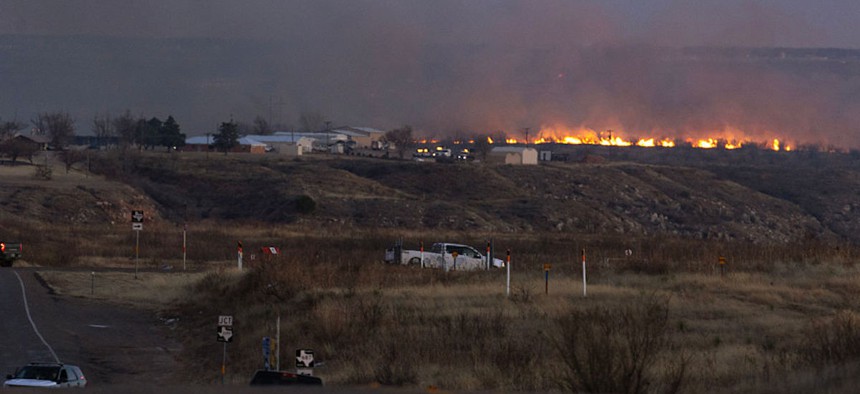Connecting state and local government leaders
Organizations like long-term recovery groups can help rural agencies get housing, financial, health care and food assistance to victims of natural disasters.
A mild winter may be a relief for snow plow drivers who dread long days on the roads, but for many communities, a mild winter often teases an early wildfire season that stretches their recovery resources to the limit.
Warm winters yield less snow, leaving grass and vegetation drier for longer and, thus, more vulnerable to flames. Such is the case in Texas, where a dry winter fueled the Smokehouse Creek Fire, which has covered more than 1 million acres, according to the Texas A&M Forest Service, making it the largest wildfire in state history. And some other states, including Michigan, Wisconsin and Wyoming, have warned residents that wildfires could ignite sooner than expected because of less snow this winter on top of last year’s hot, dry conditions.
While wildfires can devastate everyone and everything in their path, rural communities have a harder time getting back on their feet because access to disaster recovery resources and services is limited, said Andrew Rumbach, senior fellow at the Urban Institute.
Local governments are key players in protecting and healing communities from wildfires, but rural agencies know all too well how staffing and funding struggles can hinder recovery efforts. And as a recent Urban Institute analysis points out, with residents sometimes living hours apart from their neighbors, rural communities find it harder to centralize recovery resources such as outreach for financial and housing assistance.
Experiencing a natural disaster like a wildfire can feel very “isolating” for rural communities, particularly if it’s their first time being impacted, Rumbach said. “It feels like you’re against the world, [but] there’s a network of small towns and communities out there to reach out to and get advice from. People often learn best that way.”
For rural agencies struggling to provide disaster recovery services to residents on top of daily operations, long-term recovery groups are emerging as a best practice, he said. While these voluntary, sometimes faith-based organizations, can target specific constituencies, they are able to link community members with housing, financial, health care and food assistance.
“Governments … are often at the steering wheel of recovery, but they’re not the wheel,” Rumbach said. Agencies must lean on community organizations to help address the various challenges of disaster recovery that they might not have the capacity to do themselves. These groups “are much more flexible and have a different set of mandates than a local government does.”
Long-term recovery groups supplement agencies’ recovery efforts and can help make up for agencies’ lack of staff and resources. The groups can also serve as case managers and advocate for residents’ needs to government so that disaster relief resources are targeted where they are needed most for an equitable recovery, he said.
In Colorado, for example, the Marshall Restoring Our Community organization, or Marshall ROC, supports individuals affected by wildfires like the Marshall Fire of December 2021. The group includes churches, food banks, small businesses and state and local government agencies, such as the Colorado Department of Local Affairs and the city of Boulder’s Office of Emergency Management.
Marshall ROC can help residents file for federal tax relief after disasters, connect with legal services in their recovery journey and seek mental and behavioral health services to address disaster-related trauma, among other services. The recovery group also holds events throughout the year to provide additional support for residents. In July, for instance, it hosted an information session with a building advisor to discuss efficient, cost-effective home rebuilding.
Comprehensive disaster recovery is “too big of a job for anybody, so [long-term recovery groups] are absolutely essential,” Rumbach said. They can “be a source for local government—a partner, in a lot of ways—but also hold governments accountable if things aren’t going well.”

NEXT STORY: There are 100,000 fewer Election Day polling places in 2024




